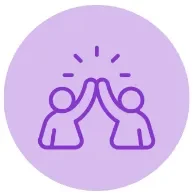
The Four Pillars
The 4 pillars of Empathy (An Chomhbhá), Creativity (An Chruthaitheacht), Leadership (An Cheannaireacht) and Teamwork (Cumas Comhoibrithe) guide schools in the Changemaker Schools Network to promote and cultivate children as Changemakers.

Empathy / An Chomhbhá
Empathy / An Chomhbhá
For the good of all
In the development of school cultures for and of social justice, the development of empathy is a key skill. Empathy in the DCU CSN occurs in many domains, but essentially in how schools address some of societies most pressing challenges such as mental health, climate change and in/equality.

Creativity / An Chruthaitheacht
Creativity / An Chruthaitheacht
Creative Problem Solving
Creativity is cited as an 21st century learning skill and is also a key competency in the Primary Curriculum Framework (NCCA).
However, the concept of creativity can often seem nebulous. Showcasing some of the work of the DCU CSN hopes to highlight the practices and pedagogy embedded in our schools to encourage creativity in primary schools.

Leadership / An Cheannaireacht
Leadership / An Cheannaireacht
Where all lead
Within DCU CSN distributed leadership is actively practised. So too is culturally responsive leadership, ethical leadership and social justice leadership. While the leadership of all teachers is key, and in particular the leadership of the Change Leaders and the Change Team; it is the leadership of students that is a particular focus.
Enhancing the leadership of students in tandem with student voice, agency and participation is not always an easy task. The purpose of the DCU CSN is to demystify this ambition.

Teamwork / Cumas Comhoibrithe
Teamwork / Cumas Comhoibrithe
Fluid and open
Teamwork and leadership go hand in hand and we use this pillar within the DCU CSN to emphasise the learning culture of each school within this professional learning network and community. It is by working together with common themes and language, to support the identity of our students as Changemakers; that real change will happen.
